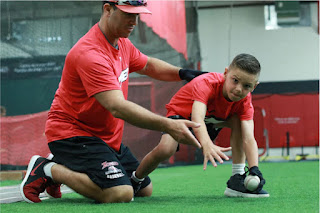Baseball Drills To Help Kids Improve Their Game
Baseball is a fantastic sport for kids, teaching them valuable skills like hand-eye coordination, teamwork, and sportsmanship. To help young players excel on the field, it's important to incorporate effective drills into their practice sessions. These drills not only improve their fundamental skills but also instill a love for the game. Here are some baseball drills that can help kids improve their game.
- Catching and Throwing Drills: Catching and throwing are essential skills in baseball. Set up a throwing progression drill where players practice throwing the ball with proper technique at varying distances. Combine this with catching drills to enhance hand-eye coordination and build confidence in fielding the ball.
- Tee Work: Tee work is an excellent drill to improve a player's swing. Place a batting tee and have kids practice hitting the ball off it. This allows them to focus on their mechanics, hand placement, and balance. It also provides an opportunity to work on consistent contact and developing a proper swing path.
- Baserunning Drills: Baserunning is often overlooked but plays a crucial role in the game. Create drills that focus on running the bases, emphasizing techniques such as rounding bases, reading signals, and sliding. Baserunning drills improve speed, agility, and decision-making on the field.
- Fielding Ground Balls: Ground balls are a common occurrence in baseball, so it's essential for kids to develop strong fielding skills. Set up a drill where players practice fielding ground balls, working on proper footwork, glove positioning, and quick transfer to the throwing hand. Vary the speed and angles of the ground balls to challenge them.
- Hitting off a Pitching Machine: Using a pitching machine allows kids to face consistent and controlled pitches. Adjust the speed and location of the pitches to challenge players at different skill levels. This drill helps improve timing, hand-eye coordination, and the ability to hit various pitch types.
- Live Batting Practice: Incorporate live batting practice where kids face real pitching from coaches or teammates. This simulates game situations and helps them adjust to different pitch speeds and locations. It also enhances their ability to make quick decisions at the plate.
- Game Simulations: Create game-like situations during practice to help kids understand the strategic aspects of baseball. Set up scenarios like runners on base or specific game situations, allowing them to practice executing plays and making smart decisions.
- Conditioning Drills: Baseball requires stamina and endurance. Incorporate conditioning drills such as running drills, agility exercises, and interval training to improve overall fitness. These drills enhance speed, agility, and endurance, enabling kids to perform at their best throughout the game.
- Video Analysis: Record kids' performances during practice and review the footage with them. This allows them to see their technique, identify areas for improvement, and make necessary adjustments. Video analysis provides valuable visual feedback and helps kids develop a better understanding of their strengths and weaknesses.
- Fun Challenges: Make practice enjoyable by incorporating fun challenges and competitions. For example, organize a home run derby or a target-hitting contest. These activities not only make practice exciting but also improve focus and concentration.
By incorporating these drills into practice sessions, coaches can help kids improve their game and develop a strong foundation in baseball. Remember to provide constructive feedback, encourage teamwork, and prioritize fun. With consistent practice and the right guidance, young players can excel and grow in their love for the game of baseball.


Comments
Post a Comment